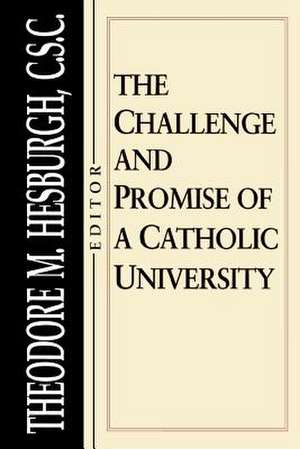Challenge and Promise of a Catholic University
Autor Theodore M. Hesburgh C.s.c.en Limba Engleză Paperback – 29 apr 1994
Preț: 175.49 lei
Nou
Puncte Express: 263
Preț estimativ în valută:
33.58€ • 34.93$ • 27.73£
33.58€ • 34.93$ • 27.73£
Carte tipărită la comandă
Livrare economică 14-28 aprilie
Preluare comenzi: 021 569.72.76
Specificații
ISBN-13: 9780268008031
ISBN-10: 0268008035
Pagini: 382
Dimensiuni: 153 x 231 x 24 mm
Greutate: 0.66 kg
Ediția:1st Edition
Editura: MR – University of Notre Dame Press
ISBN-10: 0268008035
Pagini: 382
Dimensiuni: 153 x 231 x 24 mm
Greutate: 0.66 kg
Ediția:1st Edition
Editura: MR – University of Notre Dame Press
Textul de pe ultima copertă
Contemporary Catholic higher education finds itself at a crucial crossroad. The issues are many and complex. How is the Catholic character of the university to be preserved and fostered while avoiding secularization on the one hand and insular sectarianism on the other? Must a majority of the faculty in a college or department be Catholic? How is Catholic to be defined in terms of culture, belief, or practice? What is the level of commitment to intellectual inquiry and the possibility of dissent that must be present on a Catholic campus? These are some of the issues that prompted Fr. Theodore M. Hesburgh, C.S.C., to write a position paper and invite 29 distinguished members of the faculty and administration at the University of Notre Dame to address as they strive to envision and create a great Catholic university. The contributors explore these issues from a wide variety of religious and academic perspectives, and although their backgrounds and fields of study differ widely, they agree on a number of points. First, a great Catholic university must begin by being a great university that is also Catholic. Second, the catholicity, or universality, of a Catholic university fosters the centrality of philosophy and particularly theology as legitimate intellectual concerns, especially as they challenge the disintegration and turmoil of our modern predicament. Finally, how a Catholic university is seen as a community of service is also examined in both its intellectual and practical applications. Throughout, these essays describe a university community where reason and faith intersect and reinforce each other as they grapple with all the problems that face the transmission and growth ofknowledge and the multiplication of new and complex moral problems.
